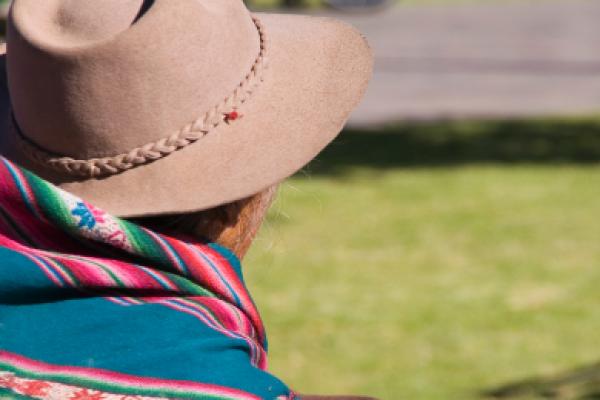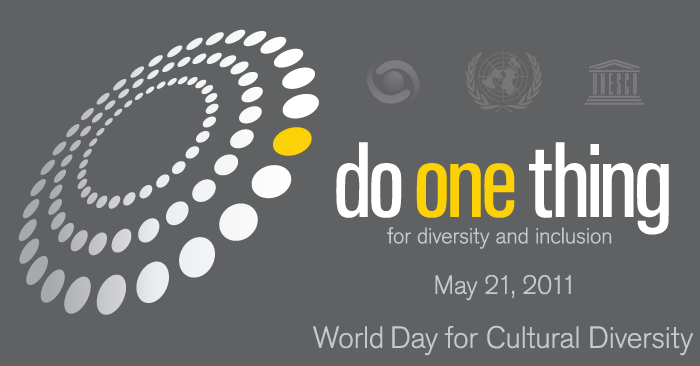The International Day for the World’s Indigenous People was first proclaimed in 1994 by the United Nations.

25% of Ecuador's population is indigenous. Their history encompasses the last 11,000 years.
In 2007, the General Assembly adopted the Declaration On The Rights Of Indigenous People. At first, Australia, New Zealand, United States, and Canada all voted against the declaration but they have all reversed their positions since.
The International Day for the World’s Indigenous People is important because in our increasingly globalized, technology-driven world indigenous people are often forgotten. This year’s theme is “Indigenous media, empowering indigenous voices.” The day aims to encourage more and more indigenous people around the world to promote and spread their culture, language, and values through traditional and new media forms…
Read more.. »
To honour the spirit of the Olympics 2012, 204 poems from around the world, from Afghanistan to Zimbabwe, have been collected from each of the 204 participating countries by the Scottish Poetry Library.
Here are the first ten from South America and the Carribean. Enjoy!
- Antigua and Barbuda: Plantain
- Argentina: Sidewalks of Buenos Aires
- Bahamas: Mangroves
- Belize: When a fish…
- British Virgin Islands: Crescendo
- Colombia: The House
- Dominica: In The Woods
- Dominican Republic: Find Work
- Ecuador: The Weathercock of the Cathedral at Quito
- Jamaica: A Song For My Father
The poems selected are often not by the most notable poet a country has produced. Some of them are funny or light-hearted. Often they are snapshots of lives rather than grand narratives. And some of the choices may be controversial. However, they all give a glimpse of lives in countries spanning the globe. Together these poems depict a world united not only by sport, but by emotions that are universal and need no translator other than the heart.
To honour the spirit of the Olympics 2012, 204 poems from around the world, from Afghanistan to Zimbabwe, have been collected from each of the 204 participating countries by the Scottish Poetry Library. 
Here are the first nine from Australia and Oceania. Enjoy!
- Australia: The Mitchells
- Cook Islands: Turakina Street
- Fiji: Tern
- Kirbati: Bonefish
- Micronesia: I follow her
- Nauru: Rains of Nauru
- New Zealand: Nowhere
- Papua New Guinea: Tuna
- Samoa: Flying-fox
The poems selected are often not by the most notable poet a country has produced. Some of them are funny or light-hearted. Often they are snapshots of lives rather than grand narratives. And some of the choices may be controversial. However, they all give a glimpse of lives in countries spanning the globe. Together these poems depict a world united not only by sport, but by emotions that are universal and need no translator other than the heart.
To honour the spirit of the Olympics 204 poems from around
the world, from Afghanistan to Zimbabwe, have been collected from each of the 204 participating countries by the Scottish Poetry Library.
Here are the first ten from Asia. Enjoy
- Afghanistan: The story of my country
- Azerbaijan: The poet’s voice
- Bahrain: All of them
- Bangladesh: Mon-doria
- Bhutan: A lesson in light
- Brunei Darussalam: Brothers, your cries…
- Georgia: Circle and rectangle
- Hong Kong: Floral Apron
- India: Homecoming
- Iran: An Iranian Professor I know asked me…
The poems selected are often not by the most notable poet a country has produced. Some of them are funny or light-hearted. Often they are snapshots of lives rather than grand narratives. And some of the choices may be controversial. However, they all give a glimpse of lives in countries spanning the globe. Together these poems depict a world united not only by sport, but by emotions that are universal and need no translator other than the heart.
To honour the spirit of the Olympics 204 poems from around
the world, from Afghanistan to Zimbabwe, have been collected from each of the 204 participating countries by the Scottish Poetry Library.
Here are the first ten from Africa. Enjoy!
- Algeria: At the water’s edge
- Angola: Build my house…
- Burkina Faso: Cattle Count
- Burundi: Come and live with me
- Cape Verde: Prelude
- Chad: from Yet the Infanta of Salamanca
- Comoros: My high powered sailing boat
- Congo: The Village
- Democratic Republic of Congo: A year of Grace
- Djibouti: Desire
The poems selected are often not by the most notable poet a country has produced. Some of them are funny or light-hearted. Often they are snapshots of lives rather than grand narratives. And some of the choices may be controversial. However, they all give a glimpse of lives in countries spanning the globe. Together these poems depict a world united not only by sport, but by emotions that are universal and need no translator other than the heart. Enjoy!
The BBC and the Scottish Poetry Library have collaborated to 
broadcast a poem on the radio every day during the London 2012 Olympics and Paralympic Games. To honour the spirit of the Olympics 204 poems from around the world, from Afghanistan to Zimbabwe, have been collected from each of the 204 participating countries.
The poems selected are often not by the most notable poet a country has produced. Some of them are funny or light-hearted. Often they are snapshots of lives rather than grand narratives. And some of the choices may be controversial. However, they all give a glimpse of lives in countries spanning the globe. Together these poems depict a world united not only by sport, but by emotions that are universal and need no translator other than the heart.
Enjoy!
For the full listing visit the Scottish Poetry Library site
“What counts in life is not the mere fact that we have lived. It is what difference we have made to the lives of others that will determine the significance of the life we lead.”
– Nelson Mandela

Mandela fought for freedom, peace, and equality.
Today is the fourth year the world celebrates Nelson Mandela Day. On the 90th birthday celebration of Mandela, in Hyde Park in 2008, the UN and the Nelson Mandela Foundation decided that this day should be an annual day to celebrate the life and work of Mandela and of a culture of freedom and peace. The basic idea behind the day is simple: The United Nations calls everyone to give 67 minutes of their day for advocating human rights, whether it means supporting your chosen charity or serving your local community. The 67 minutes are based on the 67 years Nelson Mandela gave of his life fighting for conflict resolution, democracy, human rights, peace, and reconciliation.
Mandela was born in South Africa, in 1918. He became one of the most well-known anti-apartheid activists, and was imprisoned in 1964 for his views. He spent more than 27 years in prison, during which the political climate of South Africa stormed but essentially stayed unchanged. Straight after his release in 1990, Mandela plunged into his life’s work, and in 1991 was elected the first black president of South Africa. In 1993, he was awarded with the Nobel Peace Prize.
Read more.. »
Today’s date marks the martyrdom of Guru Arjan Dev, the founder of the Sikh faith. Although many of us encounter Sikhism daily in the multicultural United Kingdom street scene, only a few know how Sikhism came to be. Today’s date is the perfect day to learn about it.

Guru Arjan Dev
Guru Arjan Dev was born in 1953. He believed that the meaning of life, and religion, was simply to live in this world and cope with everyday problems. One of his most famous quotes is “My faith is for the people of all castes and all creeds from whichever direction they come and to whichever direction they bow.” He announced this after creating the Sikhs their first central place of worship. The place for worship became known as the Golden Temple, although it was controversial in many ways. Guru Arjan Dev believed that humility is a great virtue, thus, he built the temple very low rather than tall and close to the sky as was the custom. Whats more, he ordered the temple to have entrances on all four sides. This was because Muslims believe God’s house is in the West, whereas Hindu’s believe it is in the East, and Guru Arjan Dev wanted his faith to accommodate everyone. To help raise money for the Golden Temple Guru Arjan Dev declared that Sikhs must donate 1/10 of their earnings to charity. This is still an important part of the Sikh fate today.
Read more.. »
Today is the International Day for Cultural Diversity for Dialogue and Development! Although the name of the day sounds complex, the purpose of this day is fairly simple: to celebrate cultural diversity and help us learn to live together better. In November 2001 UNESCO adopted a Universal Declaration on Cultural Diversity.

Do One Thing for Diversity
The following year, 2002, was the United Nations year for Cultural Heritage and at the end of that year the UN declared may 21st to be the International Day for Cultural Diversity for Dialogue and Development.
Ever since then, May 21st has been celebrated and commemorated through seminars, various educational programs and campaigns, exhibitions, and concerts. A grass-root campaign sponsored by UNESCO, ‘Do One Thing for Diversity and Inclusion,’ is trying to engage the international community through social media. According to the UN Secretary General Ban Ki Moon the campaign is calling for “from youth to policy-makers, from religious leaders to journalists, entrepreneurs and others who shape opinions and trends.”
Read more.. »
Holi is a Hindu spring festival that traditionally celebrates fertility and harvest.

Don't feel offended, it's Holi!
Recently, it has also gained religious elements, marking some of the ancient Hindu legends, such as the legend of Prahalad and Holika.
Although Holi has many origin stories, none of them are quite as fascinating as the celebration its self. On the streets, Holi takes the form of a carnival…
Read more.. »












 Hello, I'm Deborah Swallow and, for the last fifteen years, I've worked in over thirty countries addressing the complexities of people working internationally across multiple cultures, so individuals and organisations alike can gain an authentic competitive edge and win in international markets.
Hello, I'm Deborah Swallow and, for the last fifteen years, I've worked in over thirty countries addressing the complexities of people working internationally across multiple cultures, so individuals and organisations alike can gain an authentic competitive edge and win in international markets. 